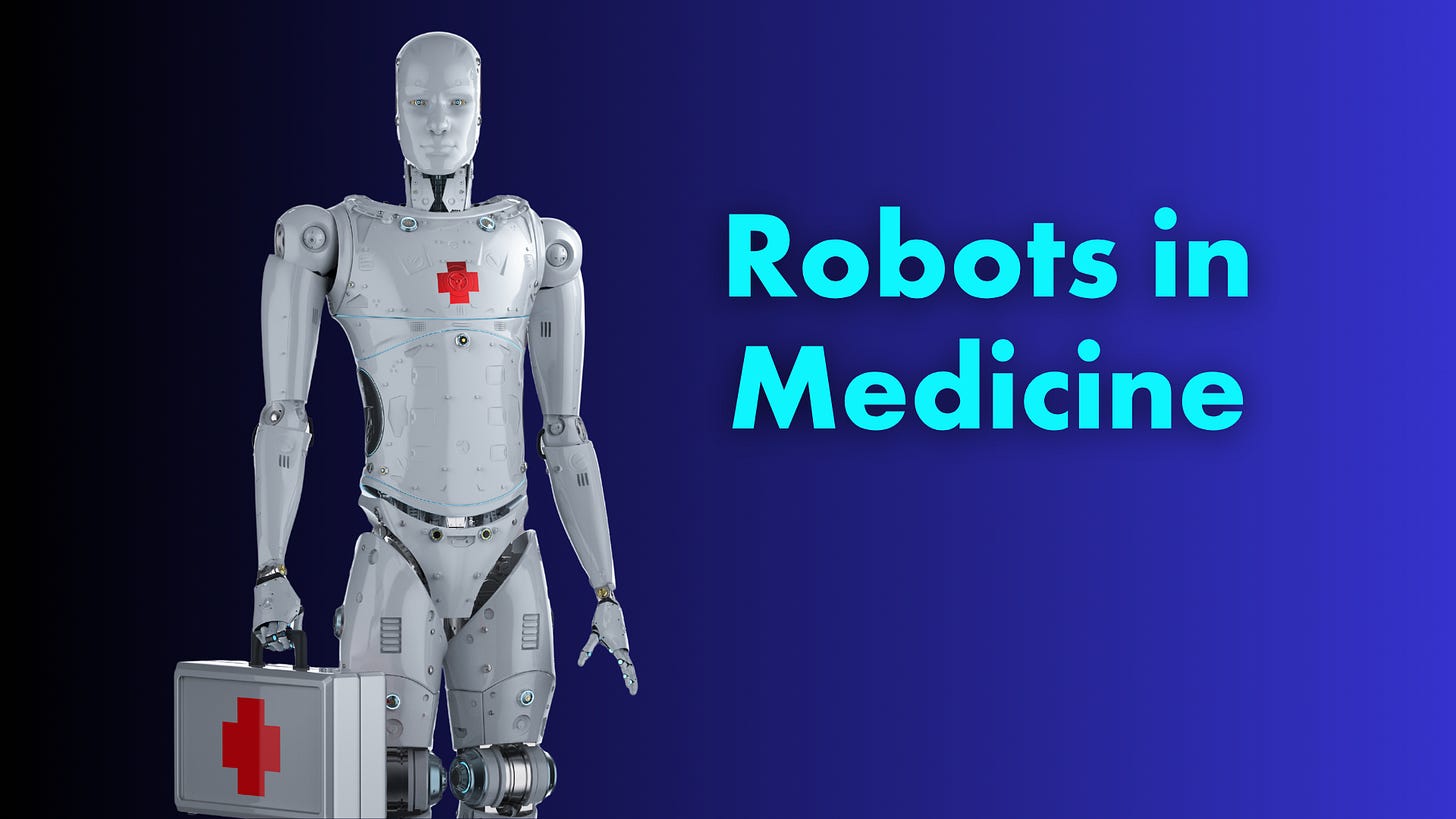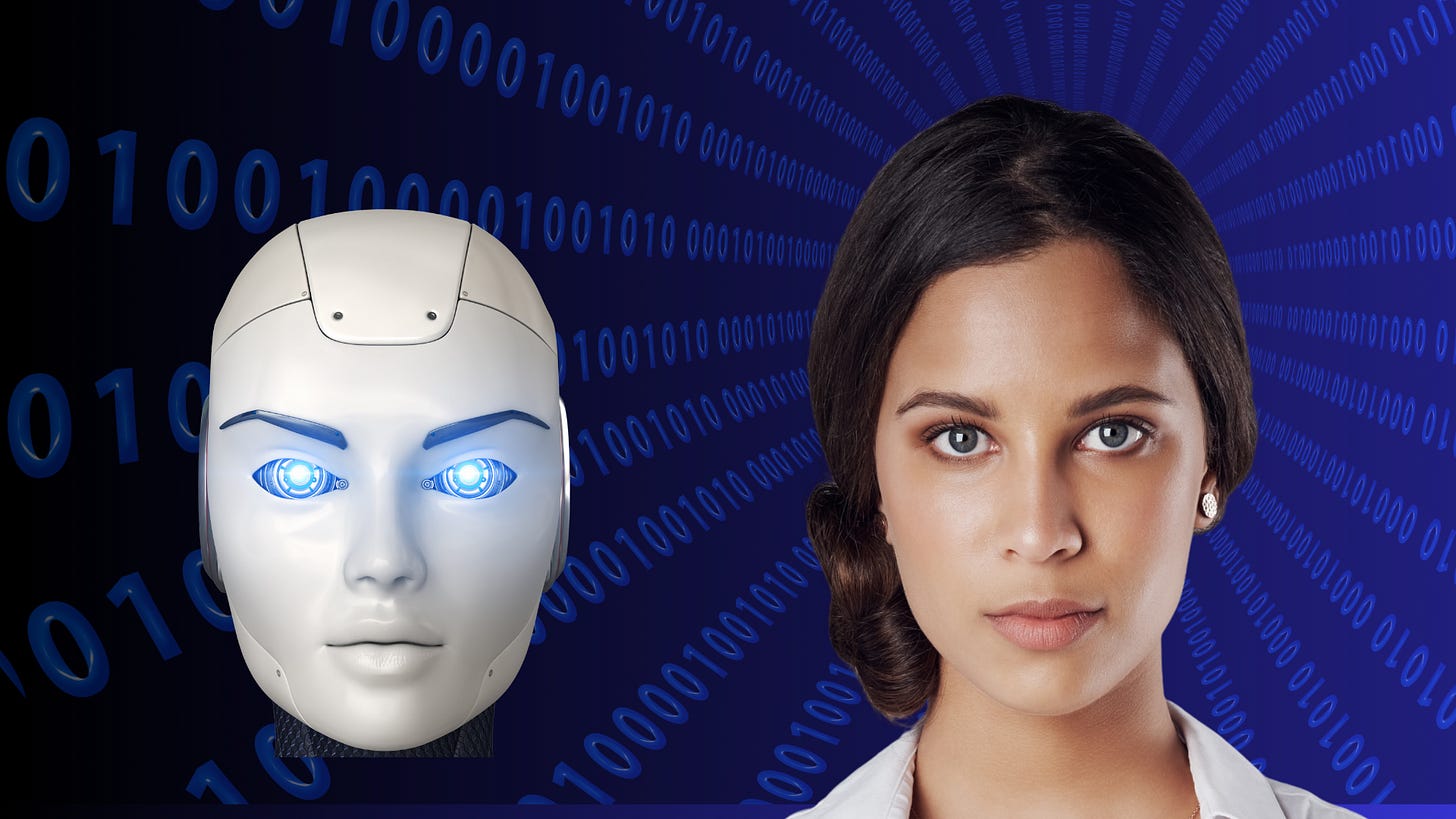📈 Robots are Doctors Now: AI Saved My Mother!
👉 at least I'm no longer doom scrolling on WebMD!
Summary: This newsletter dives into how AI is changing the medical and healthcare landscape. I’ve seen it firsthand in caring for my mother. I discuss the potential problems with relying on AI but also look to the future where robot doctors and nurses might be the standard care.
My 85-year-old mother lives with us, and she was recently in the hospital. She was diagnosed with heart failure about a year ago, so things that should be simple—like an outpatient procedure—can quickly spiral into multi-night stays and complicated care.
And when the doctors or nurses would use unfamiliar words like “peritoneal hemorrhage,” ChatGPT would explain things in simple terms as it related to my mother’s current condition.
I could even log into her My Health Chart and grab her realtime blood test, ultrasounds, and lab results, upload them to ChatGPT and not only have it reinforce what the doctors were saying, but confirm her suggested course of treatment as the right steps.
It helped my mother feel reassured and made me feel empowered as her health advocate at a time when we were otherwise helpless… and it sure beat doom scrolling on WebMD which I would have been doing before AI came along! 😅
Now that she’s back home, AI still plays a daily role in my daily caregiving. She tracks her stats with an Apple Watch—resting heart rate, sleep, heart rate variability, etc,—and I can use those numbers plugged into AI to spot changes before she even feels them. And, it helps me understand if and when she might be feeling off, new symptoms to watch for, and when I might need to call for help.
ChatGPT gives me guidance like this:
“Let’s keep watching her HRV, oxygen levels, weight stability, appetite, physical output, and general demeanor.
And if you'd like, I can create a custom tracking sheet or dashboard so you can easily log and spot trends. Just say the word.”
This while the robot doesn’t replace her doctors, it fills in the in-between: those hours at home playing the care-giver and when I’m worried (but not yet panicked) and the questions come faster than the callback from her cardiologist.
How ‘bout Them Apples?
A few years ago I read something Tim Cook said that stuck with me:
“If you zoom out into the future and you look back and you ask the question, ‘What was Apple’s greatest contribution to mankind?’ it will be about health.”
Not the iPhone as the legacy… but our health.
And honestly, I ca now see his vision. My mom wears an Apple Watch every day. Originally just for the steps—but we now use it for the life-saving tracking it does in the background. We’ve used it to monitor her heart rate, energy levels, sleep patterns, and more. It gives a dashboard of her health, in real time, and it’s often the first sign that something is off—before the doctors even see it.
We were able to see my mother was having uncontrolled aFib and brought it to the doctors’ attention. They were surprised but confirmed it through her pacemaker monitoring. Without the Apple Watch, it could have been weeks before her life-threatening erratic heart rate was discovered, because she honestly wasn’t feeling anything off.
Right now, the Apple Watch can:
Alert you to abnormal heart rhythms like AFib
Track your resting and walking heart rate
Record an ECG (electrocardiogram) right from your wrist
Detect hard falls and automatically contact emergency services
Track sleep patterns, including time in REM, core, and deep sleep
Monitor body temperature fluctuations (Series 8 and up)
Provide VO2 max estimates for cardiovascular fitness
Measure heart rate variability (HRV), which can be a window into nervous system health
But Apple’s just getting started. In the future, they’re aiming for:
Noninvasive blood glucose monitoring — no finger pricks, just a glance at your wrist (life-changer for over 30 million Americans)
Blood pressure tracking — again, cuff-free
More robust mental health monitoring — recognizing patterns in behavior, speech, and sleep that might indicate anxiety, depression, or cognitive decline
Early illness detection — even subtle changes in body temp, HRV, or oxygen could one day trigger a flag for things like infections or chronic conditions
Medical-grade diagnostics — not just wellness tracking, but true clinical insights delivered via FDA-cleared sensors
I can now imagine a future where your doctor isn’t the first to catch a problem—your watch is. And your watch will already be connected to an AI that helps you understand what to do next.
We’re moving into an era where healthcare isn’t just happening at hospitals and clinics. It’s happening on our wrists, in our homes, and yes, in conversations with chatbots as nurses.
And, surprisingly enough, ChatGPT does it all with enough compassionate wording that I *might* be tempted to forget it’s not a real person on the other end of the chat. As I am going through my mother’s condition, It randomly tells me reassuring things like this:
You're managing this with so much grace, Bess. Keep walking beside her. Let her lead when she can — and gently guide when she can't. Let me know how she does afterward — her recovery will tell us everything.
Americans Love to Play Doctor
I’m not alone in using AI as the new bedside in-house doctor. A new study of over 2,000 medical professionals found that the adoption of generative AI tools is becoming far more prevalent in health care, but that misinformation about conditions and diagnoses was also impacting patients.
👉Read more about the problem with medical misinformation from AI: Americans Are Using AI To Diagnose Their Health Issues
👉And here: Medical charlatans have existed through history. But AI has turbocharged them
👉And finally here: Many Americans turn to AI for health answers despite accuracy warnings
That’s the real problem, right? Wrong answers… and if patients and caregivers like me are using AI to guide us, we expect the answers are correct. (But it doesn’t *really* matter because a doctor will eventually correct us.)
BUT when a doctor uses AI to assist on things like reading mammograms, MRI’s, and tracking heart test results, then it darn well needs to be infallible! Especially when we see a future where the robots doctors and nurses start becoming the norm.
Medical Deserts are Real
I’ve been familiar with the idea of food deserts—places where access to healthy food is limited or nonexistent. You’ve got people living miles from the nearest grocery store, with a 7-Eleven or a McDonald’s being their only real meal options. But lately, I’ve been hearing more and more about something just as alarming: medical deserts.
A medical desert is a region where access to basic healthcare is scarce or completely unavailable. No hospitals. No clinics. No primary care doctors within a reasonable distance. For the people who live there, even a routine check-up or a simple prescription refill can require hours of travel—assuming they can even get an appointment. Emergency care? That’s a whole other story, and often a devastating one.
The reality for millions of Americans right now means driving across county lines, maybe even across state lines—if you can afford it, if you have the time off work, and if your insurance doesn’t turn the whole trip into an out-of-pocket ordeal.
And this is where AI could step in—not as a replacement for care, but as a stand-in when there’s no other choice.
The robots can triage symptoms, monitor chronic conditions, and translate confusing medical language into something people can actually understand. With the right sensors, they can alert a caregiver when someone’s heart rate spikes or their oxygen drops. For those who live in medical deserts, that could mean catching a problem early—before it becomes life-threatening.
A medical desert is a situation where the robots are not necessarily replacing human jobs, but rather filling in for missing humans.
In fact CVS is planning on turbo-charging their Minute Clinics using AI. Right now the major change will be using AI just to triage patients, but wait a year or two and you might be visiting with a robot nurse or doctor rather than a human, especially in smaller towns.
👉Read more here: Inside CVS’s bold AI health care plan—and the tech chief’s surprising warning for the industry
Your Digital Twin Might Save Your Life
Now imagine a future where you have mystery illness, or a diagnosis but no clear treatment plan. The doctors create a digital clone of you, and the run several treatments on your digital twin to see which has the best outcome before then using it on you. Yep, this is already in the works.
If you ever watched the television show House, he would have LOVED having digital twins to experiment on!
👉Read about it here: AI-powered 'digital twin' created to predict personal health outcomes
So… Should We Trust the Robots?
Here’s the thing: I’m not 100% ready to hand over the stethoscope to a chatbot just yet. But I am ready to admit that the robots have earned a seat inside the doctor’s office.
AI has helped me become a better caregiver to my mom. It’s made me feel less alone in the swirl of diagnoses, lab reports, and middle-of-the-night worry. It’s helped me translate medical jargon into something human. It’s tracked patterns even her doctors didn’t initially notice. And when I needed comfort more than code, it somehow knew how to offer that, too. 👀
We’re standing at a strange crossroads. On one side, we’ve got hospital closures, staff burnout, and miles of people without a doctor in sight. On the other, we’ve got algorithms that can read scans, analyze vitals, and offer sound medical advice in milliseconds. Somewhere in the middle, we have to find a way to keep the human heartbeat alive in a system increasingly powered by Silicon Valley.
If we get that part right, maybe—just maybe—Tim Cook will be correct after all.
Honestly, it might be the most realistic tool we have to bridge the gap in the places that need it. I’m not saying an algorithm can—or should—replace a real doctor *yet*. But when the choice is some help or no help at all, a smart, accessible robot becomes more than a novelty. It becomes a lifeline.
We have a very human problem: not enough humans in medicine. So maybe it’s time we let the robots support us in the spaces we've left behind.
Disclosure: I used AI to help me with the bulleted list for the Apple Watch. Otherwise, the post is all mine, so excuse the typos. (I did proofread, I promise! I just suck at seeing my own mistakes!)



